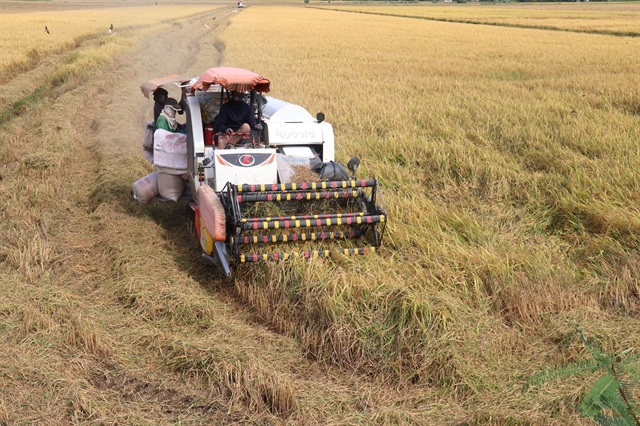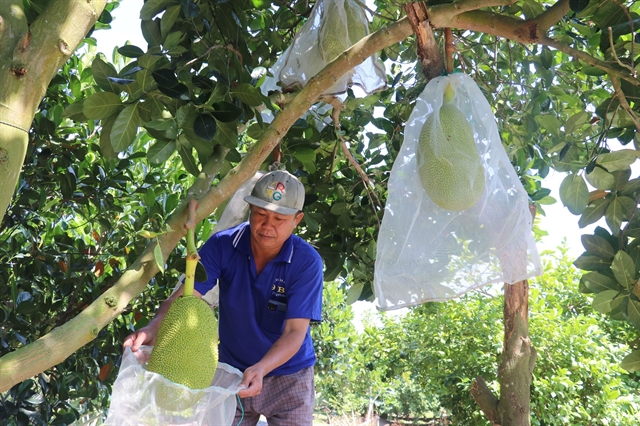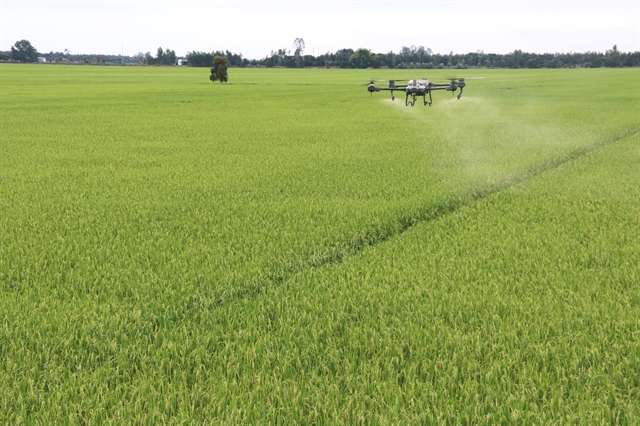 Society
Society


|
| Farmers harvest the 2024-25 Winter-Spring Rice Crop in Tân Phú Commune in Đồng Tháp Province’s Thanh Bình District. – VNA/VNS Photo Nguyễn Văn Trí |
ĐỒNG THÁP – Đồng Tháp Province is accelerating agricultural restructuring by focusing on developing key products such as rice, mangoes, flowers, ornamental plants, tra fish, and lotus.
The province’s plan for agricultural restructuring this year focuses on expanding advanced farming models, accelerating digital transformation, and developing a green, low-emission, transparent, and responsible agricultural sector.
The province’s agricultural products have been exported to more than 150 markets, including demanding markets such as the US, Japan, South Korea, and the EU.
Rice and seafood account for more than 80 per cent of the province’s export turnover.
The average annual rice planting area reaches nearly 500,000ha, with an output of 1.4 million tonnes per year.
Võ Phương Thủy, director of the provincial Department of Industry and Trade, said rice exports have played a significant role in effectively restructuring the province’s agriculture.
Besides domestic consumption, rice is exported to 36 markets, and rice exports increased by 40.6 per cent in 2021–24, she said.
Mangoes cover an area of 14,989ha, producing 176,049 tonnes annually. They are consumed domestically and exported to many markets, including the US, Japan, South Korea, and the EU.
Đồng Tháp has the largest mango and lotus cultivation areas in the Cửu Long (Mekong) Delta.
About 500 lotus-based products are made, including food, cosmetics, medicine, and handicrafts, with exports to many markets, including China and South Korea.
The province plans to convert more than 1,800ha of low-yield rice fields to perennial crops such as mango, durian, orange, and grapefruit to boost value, ensure sustainability, and adapt to climate change this year.
The cultivation of fruits such as mango, jackfruit, longan, lemon, and others earns VNĐ50–200 million (US$1,900–7,700) per hectare per year, two to eight times higher than rice farming, according to the provincial People’s Committee.
Trương Văn Thống in Tam Nông District’s Phú Đức Commune has turned his 2ha low-yield rice field into Cát Hòa Lộc and Tượng mangoes.
He earns a profit of VNĐ350-400 million ($13,400-15,300) per crop, seven to eight times higher than rice cultivation, he said.

|
| A jackfruit orchard in Tân Mỹ Commune in Đồng Tháp Province’s Thanh Bình District. – VNA/VNS Photo Nguyễn Văn Trí |
The province’s agricultural restructuring plan has established large-scale farming areas for high-quality agricultural products that meet common food safety standards, and have geographical indications, production codes and origin traceability, according to the provincial People’s Committee.
The collaboration of businesses and the positive response from farmers have helped accelerate the province’s agricultural restructuring activities, following the directions of developing agricultural product processing industries and expanding markets.
This year, the province plans to establish a supply chain for each key agricultural product and attract one or two businesses to invest in the circular economy, emission reduction, and efficient use of agricultural by-products.
Đồng Tháp is participating in the project “Sustainable Development of One Million Hectares of High-Quality, Low-Emission Rice Associated with Green Growth in the Mekong Delta by 2030”, and is implementing a plan to become a pioneering and model province in building ecological agriculture, modern rural areas, and civilised farmers.
Digital transformation
Đồng Tháp is strengthening the application of IoT (Internet of Things) and remote sensing technology to improve the management and production efficiency of agriculture.
More than 62 per cent of farmers are aware of IoT, and 20 agricultural co-operatives have adopted technology in their production processes.
Ngô Phước Dũng, director of the Mỹ Đông 2 Agricultural Service Co-operative in Tháp Mười District, said the co-operative manages 570ha of rice, and as part of its efforts to adopt digital transformation in agriculture, it has set up a smart pest monitoring station.
“This allows farmers to track pest activity in their fields directly via their mobile phones and apply Integrated Pest Management (IPM) from the start of the season, helping preserve natural predators,” he said.
The co-operative has also installed a water monitoring network, enabling it to collect and analyse environmental data such as water level, salinity, and pH at key locations and effectively manage three rice crops per year.

|
| A drone sprays pesticide over a rice field in Tân Nghĩa Commune in Đồng Tháp Province’s Cao Lãnh District. – VNA/VNS Photo Nguyễn Văn Trí |
The province has nearly 200 drones used for pesticide spraying, cutting chemical use by 20-30 per cent and working 10-15 times faster. In rice farming, they help farmers save VNĐ2-3 million ($77-115) per hectare per crop, advancing digital transformation in agriculture.
It has more than 3,800 rotary tillers and land preparation machines, 1,620 combine harvesters, and 1,153 machines for row seeding and spraying. Thanks to these machines, nearly 100 per cent of the province’s rice-growing area is now mechanised.
Many farming households in the province are applying biotechnology to produce organic fertilisers for rice and fruit trees.
Huỳnh Hữu Thuận, chairman of the An Nhơn Commune Farmers’ Association in Châu Thành District, said the model of reusing organic household waste and agricultural by-products to produce biological products is being implemented by the provincial Farmers’ Association.
Thirty-two households in the commune are taking part in the initiative. They can compost 3-5 tonnes of raw materials such as snails, fish, water hyacinths, vegetables, roots, and fruit, producing 1 tonne of organic fertiliser from these agricultural by-products, he said.
“The fertiliser reduces costs by more than 60 per cent, improves soil, revitalises trees, boosts yields, enhances fruit quality, and extends the fruit's shelf life on the tree by up to 15 days,” he said. – VNS




